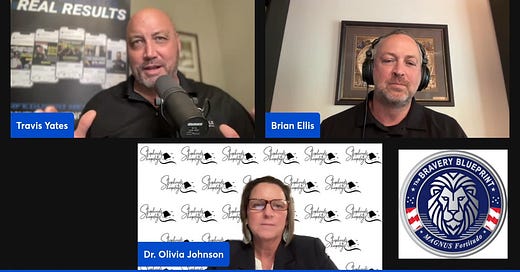In recent years, the conversation surrounding police officer wellness and suicide prevention has gained significant attention. With alarming statistics highlighting the mental health struggles faced by officers, it's crucial to explore the factors contributing to this crisis and the proactive measures that can be taken to address it. The latest episode of The Bravery Blueprint dives into the cutting-edge research by Dr. Olivia Johnson, founder of the Blue Wall Institute.
The Fatal Ten: Key Issues Affecting Officer Wellness
During her research, Dr. Johnson identified what she calls the "Fatal Ten," a list of critical issues that contribute to the mental health struggles faced by law enforcement officers. Understanding these factors is essential for developing effective prevention strategies.
Interpersonal Relationship Issues: Difficulties in personal relationships can significantly impact an officer's mental health.
Substance Use and Addiction: Many officers turn to alcohol or drugs as coping mechanisms, which can exacerbate existing problems.
Stress and Cumulative Trauma: The nature of police work exposes officers to high levels of stress and traumatic experiences.
Sleep Disturbances: Sleep issues are common among officers and can lead to further mental health complications.
Mental Health Issues: Undiagnosed or untreated mental health conditions can have serious consequences.
Physical Health Issues: Poor physical health can negatively affect mental well-being.
Firearms Access: The availability of firearms can increase the risk of suicide.
Being Under Investigation: Officers facing investigations may experience heightened stress and anxiety.
Pending or Nearing Retirement: Transitioning out of law enforcement can be challenging for many officers.
Other Issues: This catch-all category includes any other factors that may contribute to an officer's mental health struggles.
Confronting the Stigma and Misconceptions
A significant barrier to addressing officer wellness is the stigma surrounding mental health issues. Many officers fear that seeking help will be perceived as a weakness or that it could jeopardize their careers. Dr. Johnson emphasizes the importance of normalizing conversations about mental health within law enforcement.
Furthermore, there's a common misconception that police officers are at the highest risk for suicide compared to other professions. Dr. Johnson clarifies that while the rates are concerning, other occupations also have high suicide rates. This highlights the need for a broader understanding of the issue and a collective effort across various industries to promote mental wellness.
The Role of Training and Early Intervention
Dr. Johnson advocates for a shift in training approaches within police agencies. Instead of reactive measures, she emphasizes the need for proactive training programs that address the "Fatal Ten" before issues escalate. Inoculation training, which aims to equip officers with the skills and knowledge needed to navigate stress and trauma, can be a game-changer.
Moreover, early warning systems that identify officers at risk should not be punitive but rather supportive. Agencies must prioritize the mental well-being of their personnel, providing resources and interventions that can prevent crises before they occur.
Conclusion: A Call to Action
The conversation around police officer wellness and suicide prevention is critical. As Dr. Johnson highlights, there is hope for change, but it requires a collective effort from law enforcement agencies, mental health professionals, and the community. By addressing the "Fatal Ten," providing proactive training, and fostering open discussions about mental health, we can work towards reducing the stigma and ultimately saving lives.
If you or someone you know is struggling, know that help is available. Reach out to resources like the Blue Wall Institute and other organizations dedicated to supporting law enforcement personnel. Together, we can make a difference.
Travis Yates is the co-author of “The Courageous Police Leader” and has been training risk management and leadership for over two decades that have spanned thousands of students and 48 states. After dedicating over 30 years to the law enforcement profession, he is now working full-time consulting and training law enforcement leaders across the country.
Brian Ellis is a retired law enforcement lieutenant with over 25 years of service. He is the co-author of “The Theory of Magnus Ovea”, and his dedication to the theory of leadership led him to the National Command & Staff College, where he and his colleagues launched MAGNUSWorx, an education and data analytics platform dedicated to peak performance and wellbeing. Brian is a speaker, coach, and trainer for government and private organizations, dedicated to promoting leadership, high-performing teams, and providing others with actionable information for personal preparedness and resilience. His work has been featured in various media outlets, including numerous articles, book chapters, and podcasts.













Share this post